When operating boats and yachts, reliability is non-negotiable. Diesel marine generators have become the preferred power source for vessels of all sizes, delivering outstanding efficiency, strength, and performance in the harshest marine environments. This comprehensive guide explores everything you need to know about diesel marine generators and why they’re essential for optimal vessel operation.
Understanding Diesel Marine Generators
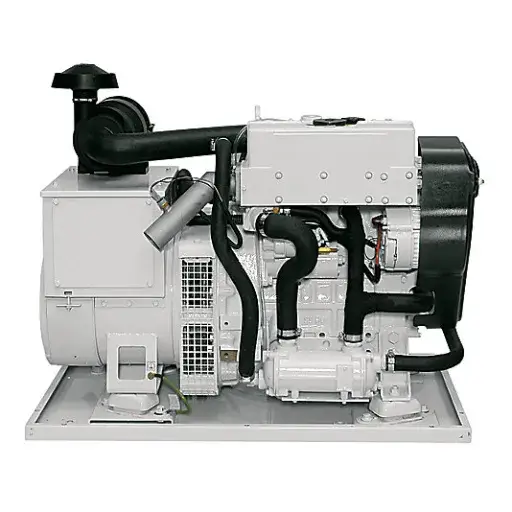
Definition and Functionality
Diesel marine generators are specialized power generation units modified for use aboard ships and vessels. These systems depend on diesel engines that transform chemical energy into mechanical energy, which is then converted into electricity to power onboard facilities and equipment—they primarily power navigation, communication, lighting, and critical appliances that support ship operations and safety.
Modern diesel marine generators feature advanced technology that reduces fuel costs and minimizes emissions while complying with environmental regulations. Their rugged construction enables operation in harsh marine environments, including saltwater, temperature variations, and continuous working conditions. With proper maintenance, diesel marine generators provide reliable power throughout their extended lifespan, making them essential for both leisure and commercial vessels.
Key Components of Marine Diesel Generators
- Propulsion Unit: Supplies the central power by converting fuel into mechanical energy needed to move the generator.
- Generator: Converts mechanical energy from the engines into electrical energy for onboard equipment consumption.
- Fuel Delivery System: Ensures a consistent supply of fuel to the engine by storing, filtering, and supplying it.
- Cooling System: Regulates generator temperature and prevents overheating by circulating coolant or using seawater.
- Operator Panel: Enables operators to control generator performance, including voltage, current, and frequency.
- Exhaust System: Safelyand adequately disperses combustion exhaust gases.
- Lubrication System: Reduces friction between moving parts, prolonging service life and maintaining optimal performance.
These components work together harmoniously to deliver reliable power for marine applications.
Types of Marine Generators
Marine generators can be broadly categorized into four main types, each with distinct advantages:
| Type | Fuel | Efficiency | Noise | Size | Maintenance |
|---|---|---|---|---|---|
| Diesel | Diesel | High | Moderate | Large | Low |
| Gas | Gasoline | Low-Moderate | High | Medium | Moderate |
| Hybrid | Diesel/Gas | High | Moderate-Low | Large | Low |
| Inverter | Gas/Propane | High | Very Low | Small | Low |
Benefits of Diesel Marine Generators
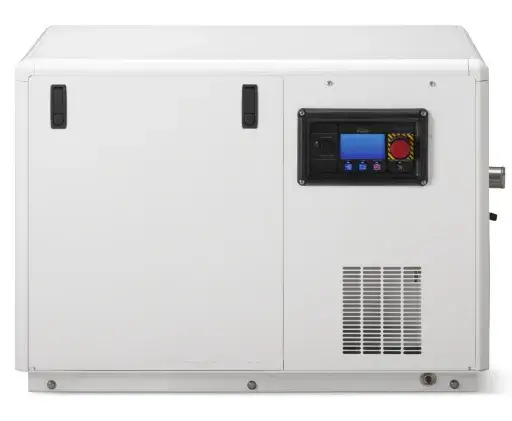
Fuel Efficiency
Diesel engines deliver exceptional fuel economy, enabling marine generators to operate for extended durations with minimal consumption—a critical advantage for long voyages.
Reliability
Diesel marine generators withstand harsh marine conditions, making them the most dependable option for critical maritime operations.
Low Maintenance
Compared to other generator types, diesel marine generators require maintenance far less frequently—a significant advantage on extended voyages.
Long Lifespan
With minimal maintenance, diesel marine generators outlast gas and hybrid alternatives, providing decades of reliable service.
Superior Power Output
Diesel generators deliver high energy outputs, ensuring effective vessel functioning regardless of onboard power demands and heavy machinery.
Fuel Efficiency and Cost-Effectiveness
A distinguishing attribute of diesel marine generators is their remarkable fuel economy. Diesel engines achieve an average thermal efficiency of 40 to 50 percent—impressive compared to other energy-generating units. This ensures minimal fuel consumption during long oceanic cruises, resulting in significantly lower operational costs for ship owners.
Beyond fuel efficiency, diesel generators are tough and long-lasting, eliminating the need for frequent purchases or repairs. This combination of low fuel consumption and extended service intervals makes diesel marine generators among the most cost-effective and eco-friendly maritime power solutions.
Durability and Longevity on the Open Water
Diesel marine generators feature robust and long-lasting construction designed for harsh marine environments. Equipment components are engineered to function effectively in high humidity and saltwater conditions, and for prolonged continuous use. The robust structure provides active protection against wear and tear while ensuring crew safety during extended voyages.
Diesel engines operate effectively across a wide range of load conditions, significantly extending their lifespan. Routine maintenance involves only oil changes and filter replacements, adding years of reliable service to any installation. This dual advantage of high strength and minimal maintenance requirements makes diesel marine generators indispensable in modern marine transportation.
Reliability and Performance in Various Conditions
Marine diesel generators excel in extended operational hours, even in extremely harsh conditions. They function reliably across varying temperatures and weather conditions—essential for vessels requiring an uninterrupted power supply to critical systems. Design considerations, including vibration management and protection of the seawater cooling system, enable these machines to operate during prolonged marine voyages without performance issues.
The consistent electrical supply from diesel marine generators is crucial for navigation, communication, and onboard systems. Modern models demonstrate improved fuel consumption efficiency, reduced emissions, and compliance with the strictest environmental regulations. Whether for long-range shipping, commercial operations, or pleasure craft, diesel marine generators perform exceptionally well under loads and in all weather conditions.
Choosing the Right Marine Generator Set
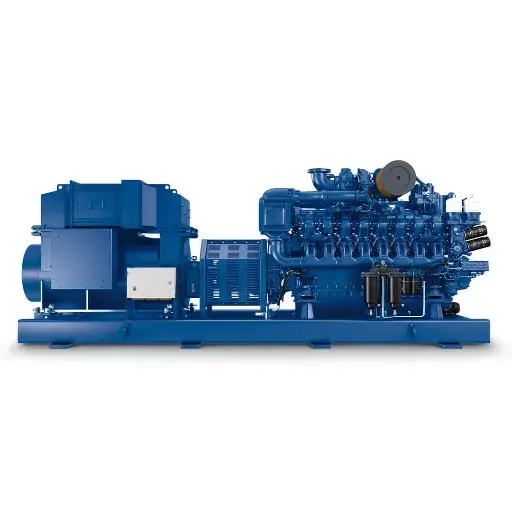
Selecting the appropriate generator requires careful consideration of several key factors:
Assessing Power Requirements for Your Vessel
Begin power calculations by listing all electrical systems and equipment aboard. Navigation, lighting, refrigeration, communication, and other fundamental systems all require electricity. Note the power consumption of each component—typically inscribed on the equipment or in its manual. Add all readings together, then factor in future equipment additions.
Appropriately chosen power capacity ensures effective operation without failure during simultaneous system use. Under-sizing risks insufficient power when needed; oversizing wastes resources. Diesel marine generators excel as both primary and standby power sources due to their flexibility.
Size and Weight Considerations
Balance onboard handling capacity against generator weight and dimensions. An oversized or hefty unit jeopardizes vessel handling, fuel economy, and storage space. A generator that’s too small may fail to provide maximum power when most needed.
Modern marine generators are engineered to be compact and lightweight while maintaining efficient performance. Consider the installation area aboard your vessel, keeping performance and stability in mind. Smaller, highly efficient units work well for small and medium-sized boats, while larger ships typically require more substantial units.
Consulting a marine consultant or reading the manufacturer’s technical manuals ensures you select the ideal generator size and weight for your specific installation. The goal is to find the minimum size meeting spatial requirements while reliably delivering your vessel’s electrical needs.
Maintenance Tips for Diesel Marine Generators
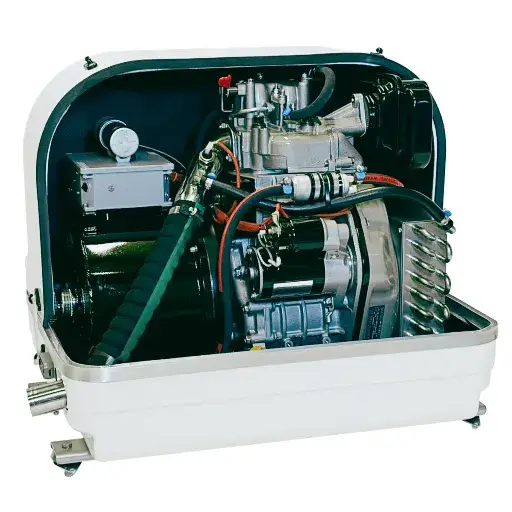
Regular Maintenance Practices
- Perform Routine Oil Changes: Follow the manufacturer’s instructions for periodic oil changes, using marine oil with additives for optimal effectiveness.
- Check and Replace Filters: Regularly inspect air, fuel, and oil filters for debris and clogs. Replace worn filters immediately to maintain engine efficiency and generator longevity.
- Monitor Coolant Levels: Maintain coolant within recommended ranges using clean coolant to prevent overheating and damage.
- Inspect Belts and Hoses: Examine belts for cracks, damage, or looseness. Replace or tighten promptly to avoid uneven operation and sudden downtime.
- Check Battery Setup: Periodically verify battery voltage and health. Clean terminals as needed and ensure proper generator connections.
- Look for Leaks: Inspect the generator casing for oil, fuel, or coolant spills. Address any issues immediately to prevent expensive repairs.
- Schedule Periodic Test Runs: Run the generator regularly to keep internal moving parts lubricated and prevent emergency-use restrictions.
Common Issues and Troubleshooting
Generators Failing to Start
Possible Causes: Dead battery, dirty fuel filters, or air in the fuel system.
Solutions: Check battery charge levels and connections; replace fuel filters if necessary; employ fuel system bleeding techniques to eliminate air.
Excessive Heat Generation
Possible Causes: Inadequate coolant, blocked seawater intake, or damaged thermostat.
Solutions: Top up coolant levels, clear blocked seawater intakes, and inspect or replace thermostat as needed.
Fluctuating Power Generation
Possible Causes: Loose electrical connections, defective voltage regulator, or worn brushes.
Solutions: Tighten connections, check and replace the voltage regulator if needed, and inspect the brushes for wear and replace as necessary.
Excessive Smoky Emissions
Possible Causes: Clogged air filters, low-quality fuel, or injector issues.
Solutions: Replace air filters, use only quality fuel, and repair or replace injectors as needed.
Oil Leakage
Possible Causes: Damaged seals, loose fittings, or excessive oil level.
Solutions: Inspect and repair seals and fittings; maintain proper oil levels. For complex issues, consult professional marine technicians.
Professional Recommendation: For any significant marine engine complications, professional marine technician inspection and repair is highly recommended to ensure proper diagnosis and resolution.
Extending the Life of Your Generator
Regular maintenance is synonymous with an extended lifespan for diesel marine generators. Follow the manufacturer’s service schedule and complete all recommended maintenance activities, including regular oil changes, air and fuel filter replacements, and cooling fluid monitoring. Inspect belts, hoses, and gaskets for damage and replace them immediately if found.
Ensure proper engine compartment ventilation to prevent overheating. Use only premium fuel with additives to prevent injector and carburetor blockages. These practices maintain optimal generator functioning and prevent unexpected failures during critical marine operations.
Comparing Diesel Marine Generators with Other Fuel Types
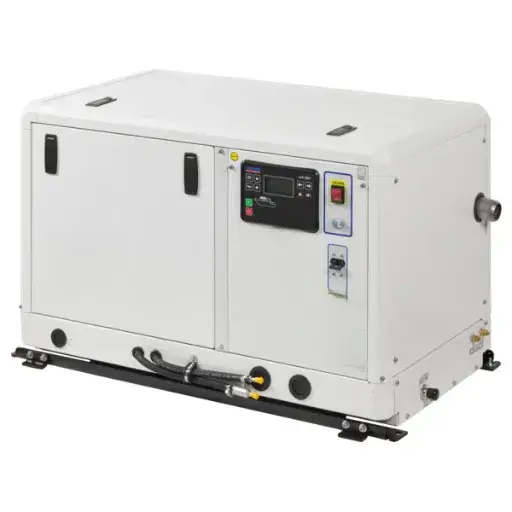
Diesel vs. Gasoline Generators
Diesel marine generators are typically more efficient, durable, and safer, while gasoline generators are lighter, less expensive, and easier to maintain. Here’s a detailed comparison:
| Parameter | Diesel | Gasoline |
|---|---|---|
| Efficiency | High | Moderate |
| Durability | Long life | Shorter life |
| Safety | Safer | Flammable |
| Cost | Higher | Lower |
| Maintenance | Complex | Simpler |
| Weight | Heavier | Lighter |
| Fuel Economy | Better | Moderate |
| Noise Levels | Quieter | Louder |
| Availability | Common | Common |
Diesel vs. Propane Generators
Diesel marine generators are more efficient, durable, and economical, while propane generators are cleaner, quieter, and require less maintenance:
| Parameter | Diesel | Propane |
|---|---|---|
| Efficiency | High | Moderate |
| Durability | Long life | Moderate |
| Economy | Better | Moderate |
| Safety | Safer | Clean burn |
| Maintenance | Complex | Simpler |
| Noise Levels | Louder | Quieter |
| Fuel Storage | Bulkier | Compact |
| Availability | Common | Less common |
| Environmental Impact | Pollutes | Clean |
Frequently Asked Questions (FAQs)
What is a marine diesel generator?
A diesel marine generator is a specialized power solution designed to provide electricity aboard vessels, supplying various onboard systems while maintaining reliability. These generators are used on both pleasure crafts and commercial marine applications and operate with minimal noise and vibration. They come in various power outputs—such as the popular 3.5kW marine diesel generator—suitable for small to medium-sized boats.
What are the benefits of marine diesel generators?
Diesel generators for marine applications are economical, reliable, and smooth-running units delivering full power to critical onboard systems. They’re renowned for silent operation, making them the preferred choice for yacht applications. Additional benefits include exceptional fuel efficiency, extended service intervals, and superior durability in harsh marine environments.
What should I consider when choosing a marine generator?
Choosing the right marine generator requires considering required power output—the total wattage needed for all systems and appliances combined. Research reputable brands such as Yanmar and Cummins that offer generators that fit your vessel’s footprint and usage patterns. Consulting with dealers and marine professionals enables well-informed decision-making tailored to your specific requirements.
What is the typical price range for diesel marine generators?
Diesel marine generator pricing varies based on brand, output specifications, and features. For example, a 3.5 kW marine diesel generator may range from several thousand to tens of thousands of dollars, depending on the brand and specifications. Compare prices from various dealers while considering warranty coverage and after-sales service to ensure quality value for your investment.
What is the role of RPM in marine generators?
RPM (revolutions per minute) determines engine operating speed, affecting fuel efficiency and power output. Many modern marine gensets feature variable-speed controls that automatically adjust RPM to load requirements, optimizing fuel consumption and reducing emissions across varied operational conditions.
What standard accessories come with marine diesel generators?
Various accessories enhance the efficiency and performance of marine diesel generators. Standard options include fuel filters, electronic control systems, and keel-cooling systems for effective engine cooling. When purchasing a generator, consult your dealer about available accessories that enhance performance and reliability for your specific marine application.
Reference Sources
-
Design of Marine Generators for Alternative Diesel-Electric Power Systems – A detailed thesis on the design and differences of marine generators.
-
Modeling and Control of Marine Diesel Generator System with Active Protection – Research on variable frequency diesel engine generators and their control systems.
-
Problems of Improving the Diagnostic Systems of Marine Diesel Generator Sets – Focuses on diagnostic systems and long-term operation of marine diesel generators.
-
Marine Diesel-Generator Model for Voltage and Frequency Variation Analysis During Fault Scenarios – Analyzes generator models and their behavior during fault scenarios.
-
Adjustment of Speed Governor for Marine Diesel Generator Engine – Studies optimization of speed governors in marine diesel generators.
Conclusion
Diesel marine generators represent the gold standard for vessel power solutions, combining exceptional fuel efficiency, reliability, and durability in one robust package. Whether operating a commercial vessel, fishing boat, or luxury yacht, these generators deliver the consistent, dependable power essential for safe maritime operations. By understanding their components, benefits, maintenance requirements, and proper selection criteria, you ensure your vessel remains powered efficiently throughout its operational life. Investing in a quality diesel marine generator and committing to regular maintenance practices guarantees years of reliable service and peace of mind on the open water.
